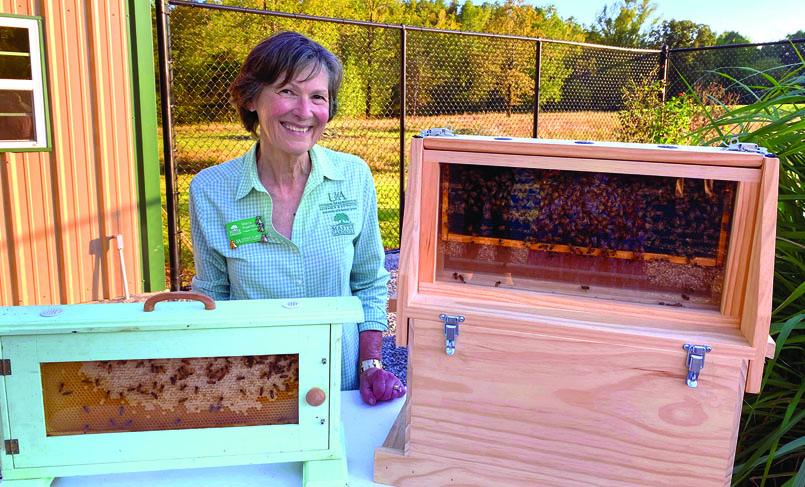27 Oct 2021 Sweet as honey
By Judy Riley
There’s a growing buzz about honeybees and beekeeping in Central Arkansas. Are honeybees essential to pollinating many plants? Is it possible to keep honeybees in your backyard without alienating your neighbors? Are there resources and training available for learning about them? The answer is a resounding yes to all!

The University of Arkansas’ specialist in apiculture, Jon Zawislak, developed a fascination with honeybees as a graduate student at the university’s Dale Bumpers College of Agricultural, Food and Life Sciences. That curiosity led to a life’s work of teaching and research into the complex world of honeybees. According to Zawislak, “Bees and other pollinators are vital to helping many plants reproduce. By efficiently transferring pollen from one flower to another, they aid in mixing up plant genetics, keeping generations vigorous, healthy, and not inbred. Some plants are wind-pollinated (grasses and cereal grains) and some can be self-fertile (many legumes), but most flowering plants benefit from insect pollinations. And honeybees (just one of 20,000 bee species) are major players.”
Here’s why bees are vital: Without pollination, plants don’t produce seeds. If they don’t produce seeds, plants don’t put resources into producing fruits that hold those seeds. Hence, we don’t get the fruits and vegetables we like to eat, not to mention the seeds that provide the next generation of crops that provide food and fiber to sustain our world.
Honeybees are not only found in rural areas, but they can thrive in urban and suburban settings, basically anywhere there are flowers in bloom. Sometimes they do better in urban areas because of well-watered landscaping at businesses and homes. Should you be afraid of being stung if your neighbor has honeybee hives? Probably not, according to Zawislak. Honeybees are out there whether you or your neighbor have hives. There’s always a potential risk of being stung. But honeybees will only sting in defense of themselves or their colony because doing so is fatal. They generally travel overhead, about 10 feet above the ground to avoid humans and other obstacles. If a bee does come buzzing around, just stay calm. They may be curious because of brightly colored clothing or scented shampoo or fragrance. Once they discover you are not one big luscious flower, they move on.
When George and Marcy Bujarski retired, they looked for a joint hobby. After attending classes taught by Zawislak, they “lit” into beekeeping. Both are members of beekeeping clubs. His club is the Beekeepers Association of Central Arkansas and hers is The Lady Beekeepers of Arkansas. They both volunteer helping others with bees and sharing bee swarms. Swarming is the natural process in which a queen and assorted other bees leave the hive to create a new one. Thus, the bees continue their life cycle. Marcy champions the beekeeping venture in the Master Gardener’s Garden at the Vines 4-H Center.
Even though an individual bee may live only about six weeks, a hive is a highly developed society. The single queen is capable of laying 1,500 to 3,000 eggs a day. The worker bees are females. The drones are males whose job is to find a future mate. The more we learn, the more we want to learn, according to Marcy.
Make no mistake, beekeeping is work and not inexpensive. According to Zawislak, it takes about $800 to get started, but it is well worth the effort. Honey from your own backyard is like no other. Once you get a taste of the pure, sweet honey, you won’t settle for less.
Resources and classes abound, just for the asking. There are more than 30 beekeeping groups in Arkansas and eight of them are active in the 501. Local Master Gardener groups are also a wealth of information. More is available at uaex.uada.edu/bees.
There are many blogs, videos, and discussion forums online, but according to Zawislak, the best information is from a reliable, scientific source, such as a university or a Cooperative Extension Service.











